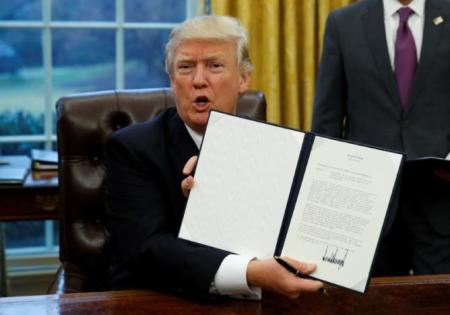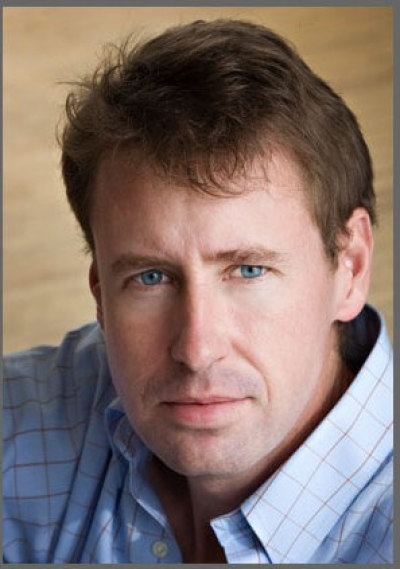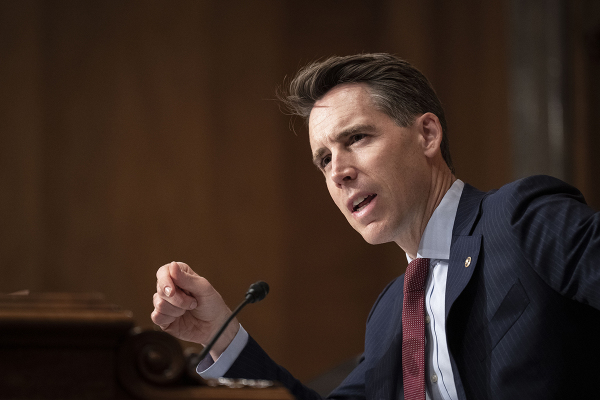If Trump Creates a Muslim Registry, Should Christians Sign Up?

A few weeks after the presidential election, I had lunch with a friend who also happens to be a Roman Catholic priest. He told me there was widespread shock and anger in his majority-Latino parish. Many worried about a forthcoming campaign of vilification against them when the new president would go in search of an enemy on whom to blame his failures.
I told him I worried also about the Muslims, and repeated a statement I'd already made to a few other friends: that if the Trump Administration ever created a registry of Islamic citizens, that I would go sign up for it myself as an act of civil disobedience.

I expected him to nod at this bold — perhaps even cocky — statement, but he gave me a look of disapprobation.
"I don't know if that's a good idea," I remember him saying. "The ancient church recognized three major sins: murder, adultery and apostasy. If you publically identify yourself as a Muslim, that's like denying your belief in Jesus."
"But I'm going to make it clear to God that I'd never deny Christ," I told him. "This is an act to protect others, not a statement of religious belief."
"There's a matter of appearance," my Catholic priest friend told me. "To others, it might appear that you are not a Christian. That's problematic."
Even though Donald Trump has not explicitly called for a national list of Muslims, he and his surrogates have already made rhetorical gestures in that direction, with a Trump PAC spokesman Carl Higbie going so far as to say the U.S. had already set "a precedent" with the Japanese internment camps of the 1940s. The specter of "lists" of people who adhere to a specific faith group also evokes images of Nazi civil servants compiling lists of Jews, as well as the possibility that dissenters of all faiths could try to foul up the census efforts by loading up the lists with their own names. In other words: you mess with my neighbor, you mess with me.
In the event that Trump finds his own Reichstag fire to gin up his own popularity to come down hard on Muslims, what would be the correct response as a Christian? Could he or she make a show of solidarity with the oppressed by registering themselves as a "Muslim" without fear of sinning, or even losing their salvation?
Jesus himself said in Mark 8:38: "If anyone is ashamed of me and my words in this adulterous and sinful generation, the Son of Man will be ashamed of them when he comes in his Father's glory with the holy angels."
There is a context for Christian disobedience to secular laws in the name of a higher ideal. One could argue that Jesus himself set the example by defying the civil authorities in Jerusalem. Martin Luther crossed not only the Roman Catholic Church but also the laws of several German principalities in his quest to establish scripture as the platform of authority in Christian life — the very birthright of the Protestant movement. He famously framed his own conflict at the Diet of Worms: "Here I stand. I can do no other." In this century, pacifist Mennonites went to federal prison rather than take up arms as conscripted soldiers in the U.S. Army, Lutheran pastor Dietrich Bonhoeffer willingly went to his own execution rather than submit to Adolf Hitler's law, and Rev. Martin Luther King deliberately broke a number of local ordinances in Southern cities to make his point.
Scripture may not be a perfect guide here. For every "Let everyone be subject to the governing authorities, for there is no authority except that which God has established" (Romans 13:1), there's going to be a story of Rahab righteously lying to the government (Joshua 2:1-13). As with many modern problems, the light of the Bible can be refracted through any number of lenses.
I went to a few other Christian thinkers to ask this question: under what circumstances could a Christian defy the gospel admonition to "render under Caesar what is Caesar's," as well as Paul's forceful command in Romans for all believers to "obey those who rule over you" because "you know that it is right."
Michael Kinman is the new pastor of my own church, All Saints Episcopal of Pasadena, Calif. He spent much of the autumn of 2014 helping with the protests against police brutality in Ferguson, Mo. and so I could anticipate where he was going to fall on the Muslim registry question.
"My signing a registry would actually be a deep act of faith in Jesus," he told me. "This is an act of solidarity with the oppressed. If it's done with love and respect, that's about the God I believe in. I'll sign it in the name of Jesus Christ. This would be the furthest thing from being ashamed of Him."
He added this decision, for him, would be with the proviso of having conversations with Muslim friends "to make sure what they want and what solidarity looks like." And he said the possibility of it happening is not far-fetched or hypothetical. "This is not an Obama-is-coming-for-your-guns event. This is something that has actually been said."
Kinman noted Jesus spent his ministry among the vulnerable and despised populations of the day. He also acted at one point to put his own body between a mob and somebody they wanted to hurt: the woman about to be stoned for adultery told about in John 8:1-11.
But there are, of course, divergent views, such as that of Kevin Lewis, the founder of the Institute of Theology & Law and a professor of the same at Biola University in La Mirada, Calif., who thinks falsely branding oneself a Muslim would be driving right up to the line of sin — not just because of the deceit but the potential endorsement of Islam which would be problematic for him.
He wrote me in an email: "Clear Biblical examples of lies told to save innocent life were not expressly condemned. Rahab lying about the Hebrew spies (Joshua 2:1-13) and the Hebrew midwives lying to Pharaoh (Exodus 1:15-17) are two examples. Here, though, the issue of a Muslim Registry is simply not a weighty enough issue to exempt one from lying about being a Muslim. There is no evidence to reasonably conclude that innocent human life is in jeopardy. Moreover, by contrast, salvation and damnation are the weightiest matters one can address. If you are a Christian, one should not say 'I am a Muslim' and possibly lead people to the conclusion that Islam and Christianity are the same religion. Biblical Christianity is the one true way of salvation. Islam is a false religion. Christians and Muslims do not worship the same God or follow the same religion. And in our Christian witness, we need to make this crystal-clear to all."
Elaine Phillips, a Distinguished Professor of Bible Studies at evangelical Gordon College, sent me a few lengthy emails with the caveat that it would be "reductionist" to give a simple answer to whether a Christian could claim Islamic faith in name of stopping a malodorous government action. But it all boiled down to: "probably not."
Phillips wrote: "Moving (gingerly) into the current geo-political arena, it seems to me that there are a number of ways within our various governmental and social structures that we can be effective witnesses for the love of God in Christ that reaches across all boundaries. That is a conversation that a number of churches are continuing to have, because we do have freedom to engage at so many levels, it does not seem necessary to compromise what is first and foremost the most precious gift we have."
But Evangelicals are not united in their allergy to explicit identification with Muslims. Andrew Wright, a Ph.D. student in Christian ethics at Fuller Theological Seminary, told me that he has wrestled with the exact same question and came down on the side of civil disobedience in the name of a greater good. The dilemma, he said, was similar to one of the classic conundrums of moral philosophy: if you were hiding a Jewish family in the attic in The Netherlands in World War II and the Nazis knocked on your door asking if you had "Jews in the attic," would you tell the truth and consign your friends to death, or tell a small lie and save your friends.
Though the gospel commands us to "render unto Caesar what is Caesar's," suggesting unwavering obedience to the government, there are times when the rest of the command — "rendering unto God what is God's" — has to prevail when the two conflict, he said.
"Christians have a tactical relationship with the state and the power structures," he said. "It's always an ad hoc kind of partnership; there's always a discernment going on."
By this light, registering as a Muslim to save one's neighbors from an unjust fate might be seen as "telling the truth" in a more meaningful way than a surface reading.
"A willingness to cross norms to show a deeper expression of the Kingdom is very much in the pattern of Jesus we see in the Gospels," said Wright.
Any Christian who confronts this question in the future — should our nation go this direction — is going to enter into a thicket of dueling scriptures and Biblical anecdotes which do not offer a clear-cut answer.
In a way, this offers some comfort. God's ways are truly higher than our ways. A national emergency that persuades Trump to create a Muslim registry might be a imperative moment for every Christian to contend with the mysteries of Scripture, the seriousness of their faith, the moral imperatives of the moment and the willingness to lay everything on the line in deeper ways that ever before.





















